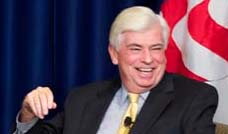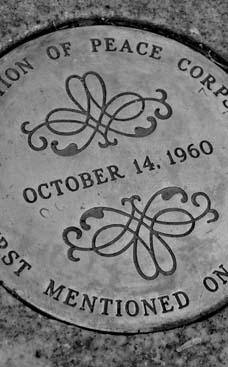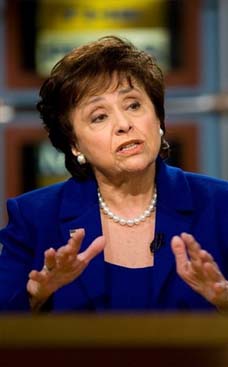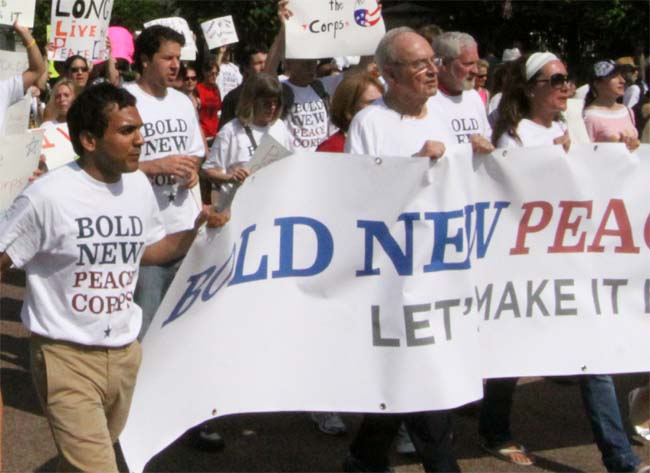
For the past two years, Nepal RPCV Rajeev Goyal has approached Congress as if it were just another Nepali settlement with a caste system to untangle. He figured out the Washington equivalent of village-well routes-hallways, hearing rooms, and coffee shops where anybody can hang around and meet a member of Congress. "He just picked off Democrats and Republicans one by one," says Sam Farr, a Democratic congressman from California. "I don't know lobbyists who are that persistent." Others complained that his unorthodox approach was too personal, but even critics acknowledged the results. During the past two years, funding for the Peace Corps has increased by record amounts, despite partisanship in Congress and a brutal economic climate. I've been in the Congress for seventeen years, and always lobbying for the Peace Corps, but I've never been as effective as I have in the last two sessions," Farr said. "And I would attribute that to Rajeev." It seems that the failure of the Peace Corps is that former volunteers rarely play the same outsider role back home, at least politically. Somebody like Rajeev could go from Namje to Congress, where he saw the place through new eyes, which made his presence disruptive. He was unusual, though. The United States is very good at shaking up the rest of the world, but it's all but impervious to anything that moves in the other direction.
Rajeev Goyal Pushes for the Peace Corps
Rajeev Goyal Pushes for the Peace Corps
by Peter Hessler
Caption: Nepal RPCV Rajeev Goyal (left holding banner), former Senator Harris Wofford (center holding banner), former NPCA President Chic Dambach (to right of Wofford), and hundreds of other RPCVS march to the White House on June 10, 2009 in support of increased funding for the Peace Corps. The rally was organized as part of " More Peace Corps," a project of the National Peace Corps Association (NPCA). Goyal has since left "More Peace Corps" and formed his own organization " Push for the Peace Corps." Photo: Hugh Pickens
In March, the Peace Corps will turn fifty years old. The anniversary is bittersweet: despite the new funding, which has allowed for a significant increase in volunteers, the agency sends fewer than sixty per cent as many people abroad today as it did in 1966. Many Americans aren't aware that the Peace Corps still exists. Its impact on foreign policy seems minimal, especially in light of the wars in Afghanistan and Iraq. Rajeev told me that the agency might have a higher profile if former volunteers applied lessons from the developing world to US politics, which is the opposite of how most people think of the Peace Corps. Instead of introducing American values to some benighted country, Rajeev wants to move in the other direction. "The way we organized this campaign was asking who was in the Peace Corps, and who cares about it. That's your blood link; that's your caste. You define your tribe." He said, "Washington is a village. Decisions in Congress, some of the biggest decisions, are based on a personal act."
Rajeev Goyal is thirty-one years old, but he could pass for a college student. He stands only five and a half feet tall, with dark skin and long-lashed eyes. He has the portable confidence of the second-generation immigrant-no matter where he goes, he knows there are benefits to being an outsider. In the part of eastern Nepal where Rajeev served as a Peace Corps volunteer from 2001 to 2003, people sometimes weep when his name is mentioned. Locals refer to him as Shiva, the god who is also the source of the Ganges River. Old folks turn on a tap and say. This is what he gave us." In the halls of Congress, most people have no idea what to make of him. For the past two years, he has approached the place as if it were just another Nepali settlement with a caste system to untangle. He figured our the Washington equivalent of village-well routes-hallways, hearing rooms, and coffee shops where anybody can hang around and meet a member of Congress. "He just picked off Democrats and Republicans one by one," Sam Farr, a Democratic congressman from California, told me. "I don't know lobbyists who are that persistent." Others complained that his unorthodox approach was too personal, but even critics acknowledged the results. During the past two years, funding for the Peace Corps has increased by record amounts, despite partisanship in Congress and a brutal economic climate. I've been in the Congress for seventeen years, and always lobbying for the Peace Corps, but I've never been as effective as I have in the last two sessions," Farr said. "And I would attribute that to Rajeev."

People usually assume that the Peace Corps came out of a grand idea, but its beginnings may have had more to do with emotions associated with village politics. In October, 1960, during the third debate of the Presidential campaign, Richard Nixon attacked John F. Kennedy by claiming that Democratic Presidents had been responsible for leading Americans into every war of the past half century. Immediately afterward, Kennedy flew to Michigan, where, at two o'clock in the morning, he made an unplanned speech on the Ann Arbor campus. He challenged the students: "How many of you who are going to be doctors are willing to spend your days in Ghana?" Kennedy had never mentioned an overseas service program, and the comment surprised his staff. As Stanley Meisler describes it in his forthcoming account of the Peace Corps, "When the World Calls," Harris Wofford, an aide who later became a senator, believes that Kennedy made the speech because he was angry about Nixon's insinuation.
Thousands of students sent letters of interest to Kennedy, and the idea also tapped into the popular feeling that the United States needed more grass-roots efforts to fight Communism. After the election, Kennedy founded the Peace Corps and appointed his brother-in-law, Sargent Shriver, as director. In less than six months, the first volunteers were sent to Ghana, where they had an immediate impact on the education system. Without the Peace Corps, roughly a sixth of Ghanaian secondary schools would have had to shut down owing to lack of teachers. Soon, there were nearly five hundred instructors in Ethiopia alone. By 1966, more than fifteen thousand volunteers were working various jobs around the world, and the agency received forty-two thousand applications that year. Plans for expansion were ambitious: Kennedy once remarked that the Peace Corps would start to become significant when it reached a hundred thousand volunteers. But 1966 turned out to lie the high-water mark. Applications plummeted during the Vietnam years, when idealistic young people weren't inclined to have anything to do with a government agency. During the seventies and eighties, volunteers continued to go overseas, where they often had a major influence on communities, but the agency's US profile diminished. Support depended on the whim of a President or a few politicians. Nixon, who hated anylhing associated with Kennedy, tried to kill the Peace Corps entirely. Reagan was surprisingly supportive, especially after a 1983 meeting with the Prime Minister of Fiji, who effusively praised the volunteers who had served in his country. A week after that meeting, a staffer presented Reagan with a proposal for slashing die federal budget "Don't cut the Peace Corps," Reagan reportedly said. "It's the only thing I got thanked for last week."
Over time, though, the Peace Corps came to embody the empty campaign promise. Everybody had heard of it, and impressions were vaguely positive, but there was no real awareness of what volunteers did or how their activities were funded. Clinton claimed that he would increase the size of the organization from fewer than seven thousand volunteers to ten thousand; George W. Bush said he wanted fifteen thousand. Obama promised to double the Peace Corps by its fiftieth anniversary. But none of them pushed hard for more money, and volunteer numbers stayed at roughly half the level of 1966, despite the fact that applications increased significantly after 9/11. In 2008, the Peace Corps' budget was S342 million-less than what the federal government spent on military bands.
To former volunteers, it seemed a wasted resource. The Peace Corps had sent Americans to Afghanistan for seventeen years, and more than forty-five thousand people had served in predominantly Muslim countries, but these things seemed to have no effect on post-9/11 policy.
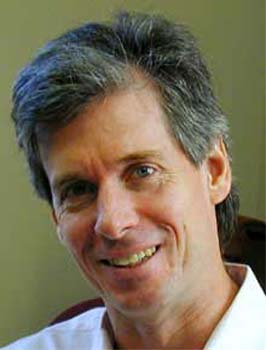
Caption: NPCA President Kevin Quigley
Kevin Quigley, the president of the National Peace Corps Association, a group for returned volunteers, believed it was time for a campaign to expand the organization. But this had to be done independently of the Peace Corps-by law, a government agency can't lobby. Quigley told me that the community of former volunteers had been too passive. "You have to get organized," he said. Quigley met with Donald Ross, a former volunteer in Nigeria who had organized public campaigns for Ralph Nader and others. With a grant from the Rockefeller Brothers Fund, they hired Rajeev Goyal, who, since leaving Nepal, had attended law school at New York University. Rajeev had continued doing development work in Namje, but he had never had any contact with Capitol Hill. At first, he tried to read up on the legislative process. "They have those books, 'How Our Government Works,' whatever," Rajeev told me. "It's the most useless waste of time." He realized that there's no legal or democratic clement-agencies like the Peace Corps arc funded through appropriations committees, which aren't outlined in the Constitution. All that matters is the personal decisions of committee members, and how they can be influenced by constituents, colleagues, and other people.
The grass-roots part was relatively easy. There are more than two hundred thousand former volunteers, and Rajeev eventually developed an e-mail list of thirty-three thousand. He installed computer software that detected whether a message had been opened, which taught him what kind of e-mail inspired people to read and forward. He also tracked his targets. Once, when I visited him in Washington, he checked his computer and told me that a recent message had been opened a hundred and thirty-three times by staffers in the office of a senator. "That means I did something right," he said. With his list, he generated enormous numbers of phone calls and e-mails from former volunteers across the country. During the week of one key funding decision, so many people called the office of Representative Nita Lowey, the chair of the House Appropriations Subcommittee on State and Foreign Operations, that Lowey's phones were completely tied up. An aide finally begged an intermediary to convince Rajeev to stop. "Call off the dogs," the intermediary' said. "The interns need to go to lunch."
Meanwhile, Rajeev contacted the kind of influential people who are known as "grasstops." He looked for Peace Corps connections: the MSNBC anchor Chris Matthews had been a volunteer in Swaziland; the chairman of the Chicago Bears had served in Ethiopia; Jimmy Carter's mother had been in India, and his grandson in South Africa. When it came to asking for favors, Rajeev was fearless-he once tried to get all four living former Presidents to sign a letter to Obama, inspiring Jimmy Carter to write back, 'This is no way to approach the President of the United States." But Carter made a call on behalf of the campaign. (I first met Rajeev when he asked me to write a letter about my years in the Peace Corps in China.)
Once, Rajeev asked Maureen Orth, a writer for Vanity Fair and Tim Russert's widow, to contact Senator Barbara Mikulski, of Maryland, in a manner so roundabout that it was like driving from DC to Baltimore via the Deep South. "He asked me to ask James Carville to ask Bill Clinton to call Senator Mikulski," Orth told me. "And that's just one of four e-mails that I got from him in a day!" Orth didn't telephone Carville, but on another occasion she called a senator on his cell phone in the middle of a meeting. "It was outrageous, but I did it for Rajeev," she said- like everybody, she used his first name when talking about him. Orth admired Rajeev's willingness to try an)thing, especially since he had appeared in Washington as if "he was dropped in there from a cloud." She said, "Who else would fly on miles all the way to Hawaii to try to see Obama's sister? And get it done! I wish he had been a reality series."
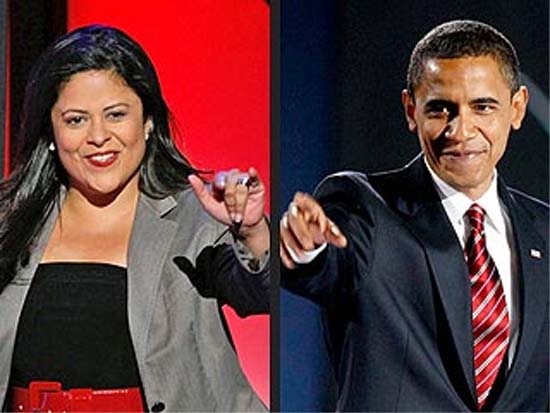
Caption: Maya Soetoro-Ng and Barack Obama . Photo: Mark Wilson/Getty; Pablo Martinez Monsivais/AP
After Rajeev heard that Obama's half sister once considered joining the Peace Corps, he solicited airline miles from another former volunteer, flew to Honolulu, put on a Hawaiian shirt, and met with Maya Soctoro-Ng. By the time he left Hawaii, he had one letter from her and another from Obama's former high-school teachers. For good measure, he also stopped by the President's favorite shaved-ice stand and got a pro-Peace Corps message from the proprietor. Maya Soetoro-Ng told me that she had never endorsed a campaign of this sort, but as an educator who had grown up in Indonesia she supported overseas service. "He seemed very professional, very affable," she said of Rajeev. "But he wasn't particularly slick about it. He was very natural and pleasant." She emphasized that she didn't represent her brother or his Administration. But, a week after Rajeev's Hawaii trip, Michelle Obama gave a speech in which she said, "My husband is committed to substantially increasing the number of volunteer opportunities within the Peace Corps."
In Namje, Tanka Bhujel had taught Rajeev that individuals often matter more than the system. The style is to go directly to the most powerful person and ask what he wants," Rajeev told me. Initially, he found this hard to do in Washington, but then he started studying a book with color photographs of everybody in the House and the Senate. He recognized Senator Bob Corker and Senator Christopher Dodd at Reagan National Airport. He struck up a conversation with Representative Russ Carnahan at the Starbucks on Pennsylvania Avenue. He ran into Representative Peter Welch late one night outside Cosi, and he met Representative Dennis Kucinich at Le Pain Quotidien. Anybody can wander around the Senate hallways-you don't even need an I.D. to get in-and Rajeev spent days there. He attended committee hearings so that he could approach key officials during breaks. He learned that the best spot in the House is the small underground rotunda that connects the Cannon and Longworth buildings; he met dozens of members there. His second year on the job, a hundred and twenty-four House members added their names to a "Dear colleague" letter in support of increased funding for the Peace Corps, which drew more signatures than any other issue.
People told him that this routine was called "bird-dogging." Lobbyists rarely work like this, because elected officials don't want to be seen in public with a special interest, but the Peace Corps is for less threatening, especially when represented by Rajeev. "It's rare that they see somebody a little bit young and a little bit brown," he said. In August, I spent time with him on the 1 Iill, and within two and a half days he had talked to fifteen senators without appointments. It was as if the political world had suddenly become very small, and yet it had a distinctly exotic tilt-Rajeev could find a Nepali connection that would start almost any conversation. He approached Mark Udall, the senator from Colorado, by mentioning that Udall's mother had also served as a volunteer in Nepal. The Senator immediately brought his hands together, bowed slightly, and said, uNa-masle" Rajeev introduced himself to Senator Dianne Feinstein by noting that her husband was the honorary consul-general to Nepal. At a breakfast for Iowa constituents, Rajeev caught Senator Tom Harkin's attention by referring to another Midwesterner who exports Tibetan rugs from Kathmandu. When he mentioned the Peace Corps, the Senator said, "I wonder how many volunteers we have in Haiti."
"None," Rajeev said. "Zero."
"None?" Harlan said. "That's unconscionable!"
"There's no money," Rajeev said. "They cut the Haiti program a number of years ago, because of unrest, but now the)' need to bring it back. That's why we're asking for an increase. I know that you were in Vietnam recently, and they'd like volunteers as well."
"I just got back from Vietnam," the Senator said. "There's no Peace Corps there?" He called to his foreign-affairs aide, who was across the room. "Tom! Tom! Agent Orange and the Peace Corps!"
The aide hustled over, no doubt wondering what die short Indian had to do with Agent Orange and the Peace Corps. That's what I want you to check on," the Senator explained, mentioning Patrick Leahy, the chairman of the Senate Appropriations Subcommittee on State and Foreign Operations, which funds the organization. Talk to Leahy about the Peace Corps and Agent Orange."
Rajeev attended a public confirmation for the Ambassador to East Timor, an Armed Forces hearing about Russian nuclear weapons, and a meeting dedicated to rare and neglected pethatric diseases. To him, this was all background noise; he sat in the back and wrote e-mails to constituents on his iPhone while waiting to bird-dog during breaks. Between sessions, he called Jimmy Carter's grandson, and the daughter of Daniel Patrick Moynihan. He studied the proposed budget that had come out of the House, making sure that he knew the figures. Certain facts were always on die tip of his tongue: the entire Peace Corps budget is less than the price of two F-22 jet planes. He calculated that it costs approximately twenty-five thousand dollars a year to send a volunteer abroad, versus a million dollars for a Foreign Service officer. The proposed budget for 2011 allocates twelve times as much to the militaries of foreign countries as it does to the Peace Corps. When he approached Senator Feinstein, she explained that a big increase would be hard in this economic climate.
Rajeev took a copy of the budget out of his pocket. "Look at the foreign military finance," he said. "It's almost five and a half billion dollars, and that includes a one-point-two-billion-dollar increase. All we're asking for is dust compared to that. It's forty-six million."
The Senator raised her eyebrows. "Just dust?" she said.
That's it."
"Well, well take a look at it."
"Look at this money," Rajeev continued. "A one-point-two-billion-dollar increase for foreign militaries, and nine hundred million for Pakistan counter-insurgency."
Feinstein had turned to go, but the numbers caught her attention. "How much is that?"
Rajeev held out the paper. "One point two billion and nine hundred million."
"Let me take a look at that," she said, and he handed over the paper. She called to an aide, "Give this to Rich." Rajeev told me that he sometimes gets into trouble for being too bold. He had recently got kicked out of a military reception for Rhode Island veterans, where he had hoped to meet a senator. When asked who he was, Rajeev responded that he was a Brown graduate and "a Peace Corps veteran." "To succeed, you have to be a little bit cunning," he told me. He didn't believe there was necessarily anything dirty about politics, but he agreed with Tanka Bhujel's description of it as a game. "It's part of being human-it's a human game," Rajeev said. "Like all games, you should relish it and take pleasure in it. People believe that in order to be in politics you have to be a politician. That's not true at all. You can be the lowest villager and still be involved."
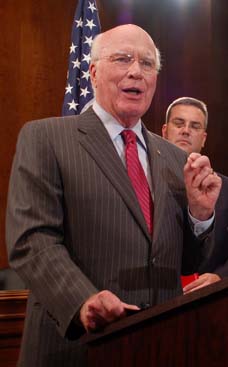
Caption: Senator Patrick Leahy, head of the Senate Committee that decides funding for the Peace Corps.
During his first year on the hill, Rajeev realized that even the President has less power than Senator Patrick Leahy when it comes to Peace Corps funding. The President makes a budget proposal which moves to the House, and then the Senate committee effectively has the final decision. And Leahy had become disillusioned with the Peace Corps bureaucracy during the George W. Bush Administration. People told me that the agency's Washington office became so poorly-managed that staffers often didn't know who Leahy was. "He would call the Peace Corps and say, This is Patrick Leahy,' and they would ask him to spell his name," Rajeev said. "And this is the guy in charge of funding them!"
Rajeev heard that Tim Rieser, Leahy's top aide for appropriations, was particularly critical. Rieser told me that the agency badly needs reform, especially in terms of directing more resources toward strategic countries. The number of volunteers in Benin, a country so small that most people wouldn't know how to find it, is only about twenty-five less than China," Rieser said. "What we want to have a conversation about is: Does that make sense?" He emphasized that the appropriations committee works with a limited budget. "Every dollar for the Peace Corps comes out of something else," he said. "It comes out of programs for water, for food aid, for refugee resettlement." Rajeev told me that Rieser was right about the Peace Corps office's needing reform, but he believed that the new director, Aaron Williams, who was appointed in the summer of 2009, was committed to making changes. Williams arrived after a successful career as a USAID administrator, and he told me that one of his top priorities was evaluating where volunteers should be sent. In any case, Rajeev thought that Leahy's perspective would change if he spent more time in the field. "You can't judge the Peace Corps by what you see in Washington," Rajeev said. He wanted funding to be taken away from military programs, not from aid. "Can you imagine how much bureaucratic waste there is when you give all this money to Pakistan and other foreign militaries?" he said.
But Rajeev couldn't figure out how to get to Leahy. He knew that the Senator likes the Grateful Dead, and he's such a Batman fan that he had a cameo in "The Dark Knight." "I talked to a longtime aide to Senator Kennedy, and I asked what I should do to convince Leahy," Rajeev told me. "She said, "Dress up in a Batman suit and stand outside the Senate.' She was serious. I thought about it." Rajeev was able to persuade Jimmy Carter to call Leahy, but he couldn't get a statement from die Grateful Dead. He called everybody on a list of two hundred former volunteers who live in Vermont, asking them to telephone the Senator. One of them happened to be the C.E.O. of the hospice that provided care for Leahy's father when he was dying, and she agreed to contact the Senator.
By this time, Rajeev's relationship with the National Peace Corps Association had begun to deteriorate. The organization wouldn't comment, but Heard from others that it became uncomfortable with Rajeev's tactics, especially after he and others began publishing editorials that targeted Leahy. Washington people responded in vastly different ways to this unorthodox approach. Republicans could be surprisingly supportive; they seemed to like Rajeev's individualism and outsider status. Elected officials and other important figures often admired his gall. Negative responses seemed most likely to come from younger people, especially congressional aides. "He makes things personal," one of them told me, and others complained that he hassled them and didn't follow the rules. Rajeev told me that each congressional office functions like a miniature village, with complex relations between the various aides and the elected official. In these villages, generational stereotypes can seem reversed: often, the younger people are most conservatively committed to a system, because they run the day-to-day affairs. Marc Hanson, a former staffer for Representative Sam Farr, told me that officials tend to relish the personal and spontaneous side of politics, whereas staff members are focussed on logistical issues. "They try to manage and choreograph that stuff," he said. "And Rajeev interrupted that process and forced members to hear about the Peace Corps on a day when it wasn't on the schedule "
When people discussed the Peace Corps campaign, they often said, in tones slightly ominous, 'You know about the ice-cream social, right?" Heard about it again and again, until the words "ice cream social" began to sound, at least to my ears, like "Bay of Pigs." Each summer, there's a Washington fund-raiser for Patrick Leahy, featuring Ben and Jerry's ice cream and other Vermont products. At the time of the 2009 event, the Peace Corps' budget had reached a critical moment. Obama had asked for S373 million, a modest increase over the current $340 million, but the House, responding to the campaign, requested $450 million. Rajeev and Laurence Learner, a former volunteer in Nepal and an author, attended the ice-cream social. In front of a large group of people, Learner introduced himself to Leahy. "Senator, I'm afraid I've got something to say that's not going to make you happy," he said, and then he read from a statement: "You should listen to your true progressive heart and not your negative aides." Leahy responded angrily, saying that he relied on his own judgment and was tired of volunteers hassling him. But Learner refused to back down: "Senator, that's what democracy is all about."
An aide finally stepped between the men and ended the exchange. Learner sent a written apology, but people involved in the campaign sensed that a line had been crossed. As Rieser told me recently, "It's not a smart way to start a conversation with the person in charge of funding."
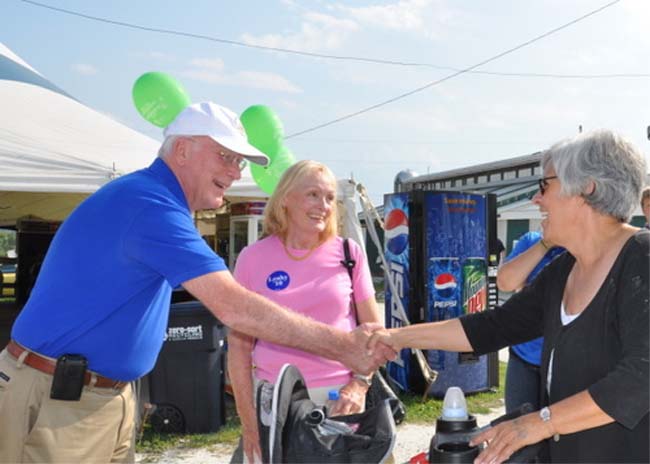
Caption: Senator Patrick Leahy at the Addison County Fair on August 11, 2010. Photo: Leahy for Senate 2010
Not long after the social, the budget came in at $400 million-the largest single-year increase ever, but far less than the $450 million that had been approved by the House. A member of the House told me that Leahy complained to him about the rudeness of former volunteers, saying, That'll cost the Peace Corps fifty million dollars." Leahy denies this. Most people viewed the campaign as a resounding success, but Rajeev had mixed feelings. After the ice-cream social, his relations with the NPCA became so bad that he left the organization. For the next year, he worked independently, supported by grants arranged by a group of advisers led by Donald Ross, the former Nader activist. He used a less aggressive approach, and the campaign resulted in the Senate's proposing a twenty-million-dollar increase for next year's budget. But Rajeev believed that critical energy had been lost; he had hoped to have a bigger effect on the Peace Corps itself, whose reforms have been modest to this point. He told me that he had taken the personal approach too far.
Village politics can be nondemocratic: there's a point at which a powerful individual hears so many unified voices that his instinct is to ignore them. Leahy had been called by everybody from his father's hospice administrator to a former President, and he was confronted at the Ben & Jerry's ice-cream social. As if that weren't enough, he also received phone calls from both Ben and Jerry. Ben Cohen told me that, after being contacted by Rajeev, he called Leahy and suggested putting more money into the Peace Corps instead of the Pentagon. I asked Cohen how the Senator had responded. "His response was 'Enough already! Everybody and his brother has been calling me about this!"*
Among charities, replicability is a key goal, but Rajeev didn't see the point of a development worker's repeating the same thing in many areas without ever sticking around to see the long-term results. He believed that construction projects tend to be overvalued, when in fact it's more important to spend time in one community as it moves forward. "People often ask me, 'How many schools has the Peace Corps built? How many hospitals?'" he said. "The Peace Corps has been very good about not playing that game. But it's part of why the organization is still small, and why people don't know as much about it." In the Peace Corps, whose twenty-seven-month commitment is longer than that for most service organizations, volunteers often become ambivalent about traditional development work. They're more likely to see the complexities of change, and less likely to cheerlead for big projects and sweeping plans. The novelist Paul Theroux, who served in Malawi in the sixties, has written critically about the NGO presence in Africa; he told me that great ambitions tend to be destructive. He was more positive about the small projects he had seen in Costa Rica which were organized at die village level. "We need to inspire people, not intimidate them," he said. There's something about all aid that is somehow subversive."
When I spoke with former volunteers, they invariably said, "I got so much more out of the experience than I gave." It was also common to hear that the Peace Corps benefits the United States more than it does the rest of the world. I didn't really believe these sentiments-they seemed to be a way of expressing humility and respect. I had always liked the slightly subversive element of the Peace Corps, because it tended to be quiet and personal.
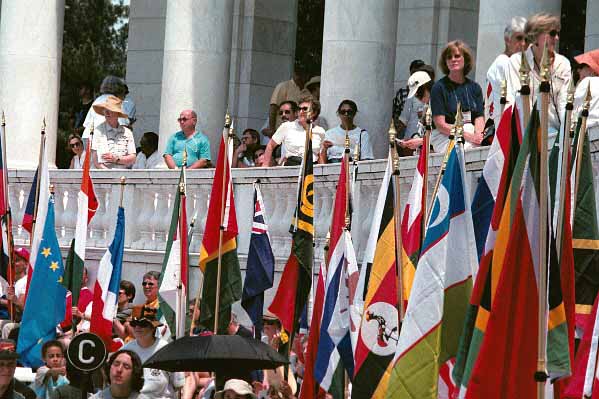
Caption: RPCVs at Arlington National Cemetary in 2002.
But it seemed that the failure of the Peace Corps is that former volunteers rarely play the same outsider role back home, at least politically. Somebody like Rajeev could go from Namje to Congress, where he saw the place through new eyes, which made his presence disruptive. He was unusual, though. The United States is very good at shaking up the rest of the world, but it's all but impervious to anything that moves in the other direction.








